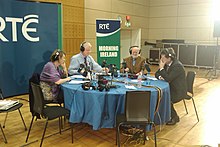David Davin-Power (born 4 April 1952) is an Irish journalist, best known for his work as a political correspondent with RTÉ News.[1]
David Davin-Power | |
|---|---|
 Davin-Power (right) | |
| Born | 4 April 1952 Portobello, Dublin, Ireland |
| Occupation | Journalist |
| Notable credit | RTÉ News |
| Spouses |
|
| Children | 5 |
Personal life edit
Davin-Power was born in Dublin and was educated at University College Dublin. He is married to Dearbhla Collins, sister of Finghin Collins; he was previously married to Christine Bowen. He has five children, three by his first marriage and two by his second.[2] He is a member of the Church of Ireland.
Broadcasting career edit
Davin-Power was one of the first presenters of Morning Ireland, along with David Hanly.[3] He is also a former Northern Ireland Editor for RTÉ News and Current Affairs.[4] In the early 1990s, he served as head of news for the now-defunct Century Radio.[5]
In August 2001, he was made Political Correspondent with RTÉ.[1] In March 2009, he made an infamous appearance on RTÉ News: Nine O'Clock from the Fianna Fáil Ardfheis surrounded by members of the party glaring at the camera.[6][dead link]
In 2015, Davin-Power co-presented the RTÉ documentary Gallipoli - Ireland's Forgotten Heroes, discussing the World War I campaign from an Irish perspective.[7]
References edit
- ^ a b "RTÉ announce appointments". The Irish Times. 8 August 2001. Retrieved 10 December 2009.
- ^ Susan Daly (14 June 2008). "Dad's the word". Independent.ie. Archived from the original on 1 May 2009. Retrieved 18 September 2010.
- ^ "Star of the Day: Morning Ireland". RTÉ Guide. Archived from the original on 11 September 2012. Retrieved 10 December 2009.
- ^ "RTÉ News Interactive: Westminster Election and Referenda". RTÉ News. 9 June 2001. Archived from the original on 11 October 2009. Retrieved 10 December 2009.
- ^ O'Carroll, Lisa (19 April 1991). "Century licence in jeopardy". Broadcast.
- ^ "You've been framed". The Irish Times. 7 March 2009. Retrieved 10 December 2009.
- ^ "Gallipoli - Ireland's Forgotten Heroes". Trinity College Dublin. Retrieved 11 July 2016.